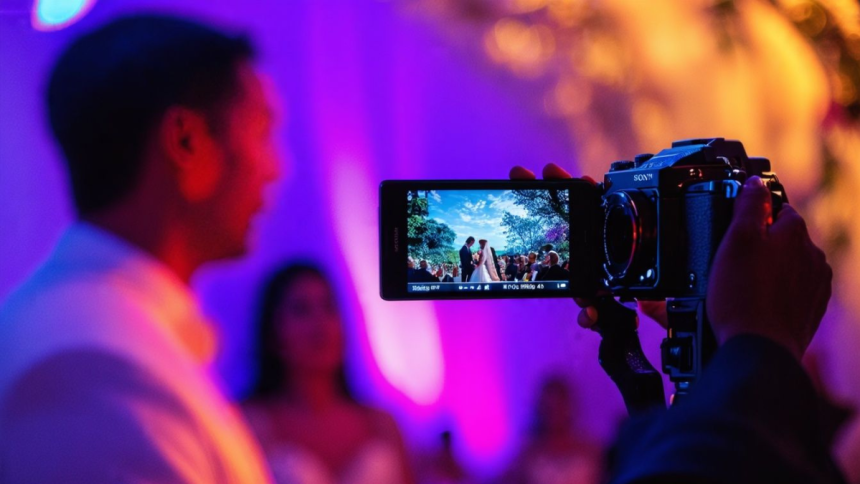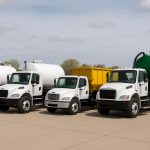Weddings are a tapestry of emotion, movement and fleeting moments. Capturing these moments in their purest form requires more than just a good eye. It needs the right equipment – tools designed to handle the unique challenges of wedding environments. Specialist cameras used by wedding videographers have become the backbone of this craft, so every precious second is preserved in stunning detail.
From the soft glow of candlelit vows to the frenetic energy of a packed dance floor, these cameras are built to thrive in unpredictable situations. Their advanced features allow for seamless adaptation, whether the scene requires subtlety or drama. This guide explores the world of specialist cameras wedding videographers like DC Mrdia use, what makes them tick, the types available and the accessories that make every frame pop.
Key Features of The Best Specialist Camera for Wedding Videography
Choosing the right camera for wedding videography is about more than just brand loyalty or technical specs. It’s about balancing reliability, versatility and performance under pressure. Here are the key features that set the best specialist cameras apart:
– Exceptional Resolution: Modern wedding videography demands crisp, detailed footage. Cameras with 4K or higher resolution are now the norm, so every intricate detail – from the embroidery on a wedding dress to the sparkle on a ring – stands out in incredible clarity.
– Outstanding Low-Light Performance: Weddings take place in venues with tricky lighting. Specialist cameras used by wedding videographers have large sensors and high ISO capabilities to capture clear, vibrant images in low light. These features prevent footage from looking grainy or washed out and preserve the atmosphere of the moment.
– Fast and Accurate Autofocus: Events move fast, and there’s no room for error. Advanced autofocus systems track movement seamlessly, locking onto subjects like a couple’s first dance or a spontaneous hug. This means every important moment is captured sharp, no matter the pace.
– Portability and Ergonomics: A wedding day is a marathon, not a sprint. Lightweight and compact cameras allow you to move through crowds and tight spaces. Ergonomic design reduces fatigue, so you can stay agile and responsive all day.
– Durability and Reliability: From outdoor ceremonies to busy receptions, cameras have to withstand a lot. Weather-sealed bodies and rugged construction mean these specialist cameras can take bumps, splashes and the occasional knock and keep on going from start to finish.
These features combined mean the specialist cameras used by wedding videographers deliver consistent, high-quality results no matter what.
Camera Types and What’s Best for Wedding Videography
Wedding videography is diverse, not just in style but in the types of cameras used. Each camera type has its own strengths for different creative visions and logistical needs.
1. Mirrorless Cameras: The go-to choice is mirrorless cameras, which are portable and advanced. The Sony A7 IV or Canon R6 are compact, great in low light and fast autofocus. They can shoot stills and videos, perfect for dynamic wedding environments.
2. DSLR Cameras: A classic in the world of photography and videography, DSLR cameras like the Canon 5D Mark IV are reliable and have great colours. It is slightly bigger than mirrorless but more affordable and has a familiar interface for those used to traditional camera systems.
3. Cinema Cameras: Cinema cameras stand out for a truly cinematic look. Specialist cameras used by wedding videographers in this category, like the Blackmagic Pocket Cinema Camera 6K, have great dynamic range and colour grading options. Perfect for creating stunning, film-like wedding videos or corporate videos.
4. Action Cameras: Small but mighty action cameras like GoPros are great for unique perspectives. Whether mounted on a car for a dramatic arrival shot or discreetly placed to catch candid guest reactions, these cameras add creativity and spontaneity to wedding films.
5. Camcorders: Built for long recording sessions, camcorders like the Panasonic HC-X2000 have intuitive controls and powerful zoom lenses. Reliable and easy to use, it is perfect for capturing long events without interruption.
Each camera type serves a purpose, so you can tailor your approach to the wedding.
Top Camera Models for Wedding Videography
Some camera models have earned a reputation in the wedding videography community. These top models deliver performance and reliability for the job.
– Sony A7S III: Great in low light and 4K video, this camera produces sharp, vibrant footage even in tough conditions.
– Canon EOS R5: Shoots 8K and handles fast motion, producing warm, natural colours perfect for wedding settings.
– Blackmagic Pocket Cinema Camera 6K Pro: Favourite for its cinematic look, has professional grade colour grading and dynamic range, and takes wedding films to the next level.
– Panasonic Lumix GH6: High-resolution video and advanced stabilisation in a compact body, great for any shooting situation.
These are some of the top specialist cameras wedding videographers use, turning everyday events into epic stories.
Top Accessories for Amazing Wedding Films
Cameras are the main event, but accessories are the supporting cast. The right accessories go hand in hand with the specialist cameras used by wedding videographers, so everything is captured perfectly. The right tools can turn good footage into great memories.
– Stabilisers: Gimbals and tripods for smooth, steady shots, whether gliding across a dance floor or capturing a venue panorama.
– Lenses: Fast prime lenses like a 50mm f/1.2 create beautiful bokeh, while versatile zooms offer flexibility for any composition.
– Microphones: Good audio is key. Shotgun and lavalier mics capture vows and speeches clearly, so the day’s emotion is preserved.
– Extra Batteries and Memory Cards: Weddings are unpredictable and often run long. Spare batteries and plenty of storage mean no moment is missed due to technical issues.
Choosing the Right Specialist Camera for Wedding Videography
Choosing a camera is about more than just specs. Here are some practical considerations:
1. Budget: Cinema cameras offer the best quality but come at a cost. Mirrorless cameras are a balance between affordability and performance.
2. Experience Level: New to videography? DSLRs are more approachable. Seasoned pros prefer the creative control of cinema cameras.
3. Workflow Compatibility: Some cameras integrate with popular editing software for a smoother post-production process.
4. Portability vs Power: Lightweight mirrorless cameras are easy to carry all day, while heavier cinema cameras deliver better image quality if you’re willing to lug the extra weight.
Elevating Wedding Memories with Specialist Cameras
The evolution of specialist cameras used by wedding videographers is changing the art of wedding filmmaking. With AI autofocus, 4K recording and smaller designs, these cameras are more capable than ever. Each innovation opens up more opportunities to capture the magic of weddings, so every laugh, every tear and every dance is preserved in stunning detail.
By combining the right camera, the right accessories and thought into your individual needs, creating timeless wedding films is not only possible but inevitable. The journey from moments to memories begins with the right equipment – designed to capture love in its purest form.
Lynn Martelli is an editor at Readability. She received her MFA in Creative Writing from Antioch University and has worked as an editor for over 10 years. Lynn has edited a wide variety of books, including fiction, non-fiction, memoirs, and more. In her free time, Lynn enjoys reading, writing, and spending time with her family and friends.















